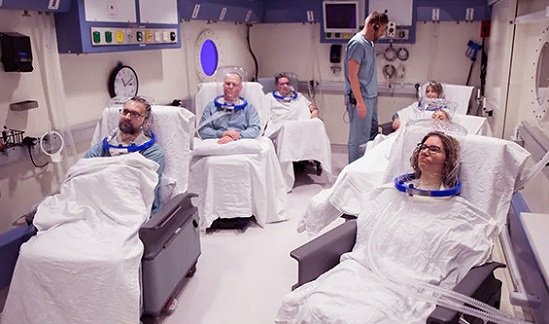Nikhil Prasad Fact checked by:Thailand Medical News Team Oct 21, 2024 5 months, 3 weeks, 2 days, 1 hour, 3 minutes ago
Medical News: Understanding the Dangers of Hyperbaric Oxygen
Researchers from several leading institutions, including the Department of Rehabilitation Medicine at Nanjing Medical University in China and the Naval Medical Center in Shanghai-China, have uncovered new findings on how hyperbaric oxygen (HBO) exposure can cause acute lung injury (ALI). HBO, commonly used in clinical treatments and diving medicine, can help in conditions like decompression sickness and hypoxia. However, this
Medical News report reveals that excessive exposure to high-pressure oxygen can lead to significant lung damage, especially when the exposure lasts longer than six hours.
 Hyperbaric Oxygen Can Cause Severe Lung Damage
The Experiment: Unveiling Lung Damage in Mice
Hyperbaric Oxygen Can Cause Severe Lung Damage
The Experiment: Unveiling Lung Damage in Mice
In a detailed study, the research team conducted two independent experiments. The first experiment focused on the effects of varying HBO exposure times on lung damage. Mice were placed in a controlled environment with over 95% oxygen at two times the normal atmospheric pressure (2 ATA) for periods of 2, 4, 6, and 8 hours. The results were startling: as early as 4 hours of exposure, the alveolar-capillary barrier - the lung's protective layer - showed signs of damage. At 6 hours, significant lung tissue damage was evident, including inflammation, hemorrhaging, and the infiltration of inflammatory cells.
The study highlights that the lung injury progressed even after the mice were removed from the high-oxygen environment. The inflammatory markers in the lungs peaked at 12 hours post-exposure, and recovery did not begin until after 24 hours. This is contrary to the common belief that lung damage stops when exposure to high oxygen levels ends. Instead, the study found that the injury continues, particularly affecting the alveolar-capillary barrier, which is the most sensitive and slowest part of the lung to recover.
Key Findings: Alveolar-Capillary Barrier is the Weakest Link
The alveolar-capillary barrier, which regulates the passage of oxygen into the bloodstream, showed the earliest and most persistent damage from HBO exposure. Even after the oxygen levels returned to normal, the barrier remained compromised, indicating that recovery from HBO-induced lung injury takes time. Significant changes in the levels of tight junction proteins (which help maintain the integrity of the barrier) were noted at 4, 6, and 8 hours of exposure.
The researchers also noticed that inflammation in the lungs, marked by increased levels of specific proteins like ICAM1 and VCAM1, spiked after 6 hours of exposure. These proteins play a role in attracting white blood cells to the site of injury, which is part of the body’s defense mechanism but also contributes to further damage in cases of overexposure to oxygen.
What Happens After HBO Exposure?
In the second experiment, the researchers studied the recovery process by examining the lung tissue at different time points - immediately after HBO exposure, 12 hours later, and 24 hours later. They found that although infla
mmation began to subside after 24 hours, the damage to the alveolar-capillary barrier persisted.
Lung tissue samples showed significant improvements in inflammation markers 24 hours post-exposure, but proteins that help maintain the lung's structural integrity, like VE-Cadherin, remained altered. This suggests that while the body begins to heal after HBO exposure, the lungs' protective barrier takes longer to repair.
The Study's Broader Implications
This research is crucial because it challenges long-standing assumptions about oxygen therapy. HBO is commonly used in hospitals to treat conditions ranging from severe infections to decompression sickness in divers, but there are potential risks. The study’s findings emphasize the importance of monitoring patients closely during HBO treatment, especially those exposed for extended periods. It also suggests that additional interventions might be necessary to protect the alveolar-capillary barrier from long-term damage.
The researchers noted that markers of oxidative DNA damage increased significantly after 6 hours of exposure, indicating that high-pressure oxygen generates harmful reactive oxygen species (ROS). These ROS can damage DNA, proteins, and lipids, leading to cellular injury.
Interestingly, apoptosis, or programmed cell death, did not significantly increase in this study, which suggests that short-term HBO exposure causes less severe long-term cellular damage compared to normobaric oxygen therapy (where oxygen is delivered at normal atmospheric pressure). This finding could inform the development of new therapies to prevent or treat HBO-induced lung injury.
Conclusion: The Road to Safer Oxygen Therapy
The study provides a deeper understanding of how high-pressure oxygen affects lung function, specifically highlighting the role of the alveolar-capillary barrier and inflammation in lung injury. The findings suggest that while inflammation subsides relatively quickly, structural damage to the lungs takes longer to heal. This information could help guide the development of safer oxygen therapies, ensuring that patients receive the benefits of HBO without risking long-term lung damage.
The study’s findings were published in the peer-reviewed journal: Frontiers in Physiology.
https://www.frontiersin.org/journals/physiology/articles/10.3389/fphys.2024.1474933/full
For the latest on Hyperbaric Oxygen, keep on logging to Thailand
Medical News.
Read Also:
https://www.thailandmedical.news/news/pet-scans-shows-hyperbaric-oxygen-therapy-improves-alzheimer%E2%80%99s-disease-in-the-aged
https://www.thailandmedical.news/news/growing-number-of-published-studies-show-that-hyperbaric-oxygen-therapy-hbot-might-be-useful-for-long-covid-
https://www.thailandmedical.news/news/hyperbaric-oxygen-aid-existing-treatments-against-brain-cancer
